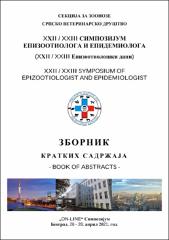| dc.contributor.author | Prodanov-Radulović, Jasna | |
| dc.contributor.author | Mirčeta, Jovan | |
| dc.contributor.author | Grubač, Siniša | |
| dc.contributor.author | Petrović, Tamaš | |
| dc.contributor.author | Pušić, Ivan | |
| dc.contributor.author | Polaček, Vladimir | |
| dc.date.accessioned | 2021-06-22T11:49:10Z | |
| dc.date.available | 2021-06-22T11:49:10Z | |
| dc.date.issued | 2021-04-26 | |
| dc.identifier.isbn | 978-86-83115-41-9 | |
| dc.identifier.uri | https://repo.niv.ns.ac.rs/xmlui/handle/123456789/367 | |
| dc.description.abstract | Biosecurity measures in hunting grounds include application of different procedures, which reduces the risk of introduction and /or spreading of African swine fever (ASF) virus. The implementation of biosecurity measures before, during and after the end of wild boar hunting, we simultaneously protect the population of wild boars and domestic pigs in the Republic of Serbia. The paper presents the results of epizootiological surveillance and biosecurity control in organized, closed and open wild boar hunting grounds. In our analysis nine closed and open hunting grounds on the territory of Vojvodina Province are included. The achieved results indicate that when considering the locality of the hunting ground, from the epizootiological aspect, the immediate environment should be considered, i.e. villages where extensive breeding of domestic pigs in the backyards and smallholdings dominate. At the same time, it is evident that domestic pigs are often kept as free-fange in the forest, which currently represents the highest possible risk for the spreading and transmission of the ASF virus between the two populations. From the aspect of the implementation of external biosecurity measures in the hunting ground, it is important to have an appropriate complete fence for the wild boars in order to limit their movement outside the hunting ground. Within the hunting ground, a disinfection barrier for vehicles as well as a disinfection point for all visitors entering the ground should be provided. It is necessary to ensure continuous control of all persons, hunters, vehicles, clothing and equipment entering the ground. From that aspect, the introduction of vehicles, equipment of unknown origin as well as food of animal origin into the hunting ground should be prohibited. Hunters play a key role in monitoring wildlife health and reporting dead wild boar (passive surveillance) to veterinarians and epizootiologists. Therefore, close communication and cooperation between local veterinarians, epizootiologists and hunters is the key to success in preventing the spread of ASF and controlling the biosecurity. It should be pointed out that continuous organization of training for hunters and all persons involved in hunting activities is important activity. | en_US |
| dc.description.sponsorship | This work was funded by Ministry of Education, Science and Technological development of Republic of Serbia by the Contract of implementation and financing of scientific research work of NIV-NS in 2021, Contract No: 451-03-9/2021-14/200031 from 05/02/2020 | en_US |
| dc.language.iso | other | en_US |
| dc.publisher | SVD, Sekcija za zoonoze, Beograd (Srbija) | en_US |
| dc.source | Zbornik kratkih sadržaja, XXII/XXIII Simpozijum epizootiologa i epidemiologa (XXII/XXIII Epizootiološki dani), on-line, Beograd | sr |
| dc.subject | African swine fever | en_US |
| dc.subject | wild boar hunting grounds | en_US |
| dc.subject | biosecurity | en_US |
| dc.title | Afrička kuga svinja - kontrola biosigurnosnih mera u lovištima divljih svinja | en_US |
| dc.title.alternative | African swine fewer – control of biosecurity measures in wild boar hunting grounds | en_US |
| dc.title.alternative | | en_US |
| dc.type | Article | en_US |

